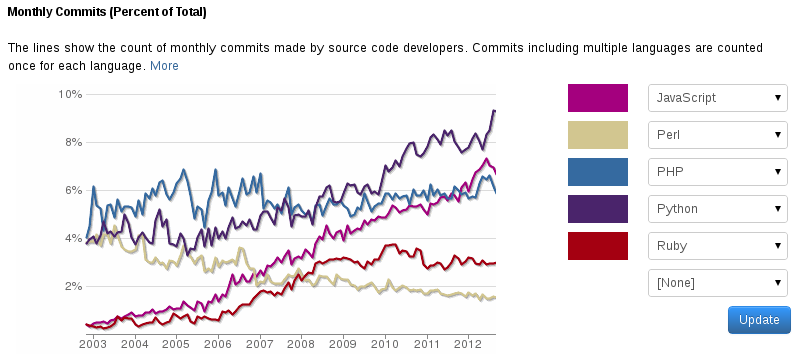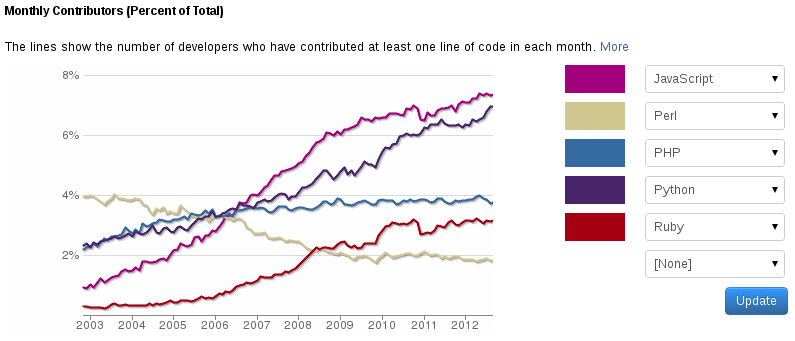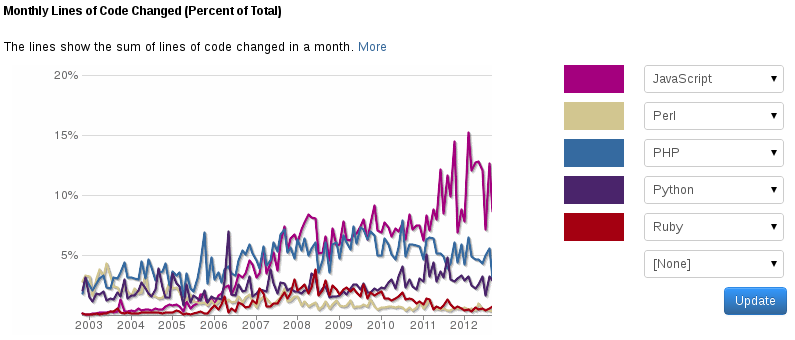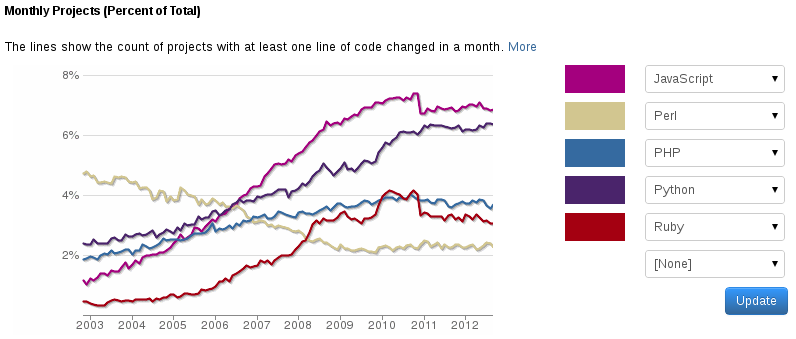Another Perl's doomsday statistics?
From ohloh.net:




I'm thinking no. Yes, Perl hasn't gained market share. It tends to stabilize these last three years, see especially if you see the contributors graph. But Perl was way too popular back then anyway, due to lack of alternatives for web languages (which is bad, in some ways). Come to think of it, there should be a lot more PHP and JavaScript developers than Perl developers, right?
One fairly obvious thing to note is that the site "ohloh.net" doesn't seem to follow many Perl projects. I found only one module. Also, it seems to regard github forks of the same thing as different projects. I think these numbers and graphs are not really meaningful.
Yeah, after playing with the site for a while earlier today, it seems that they are having problems with content quality and aggregation. I imported my projects from github and ended up with literally hundreds of committers (despite having used only 1-2 email addresses) which I need to "claim" manually. Also, the project names are a mix-mash of repository names, user-submitted names, and what not. For perl module projects alone there are names in the style p5-Foo-Bar, Bar::Baz, perl-Qux-Quux, "Foo (perl)" and probably lots more variations (and who knows how many duplicates).
FYI, I'll start fetching this page periodically:
https://github.com/languages
Github itself currently doesn't show how languages' share change over time.
Sorry, the above should say "I found only one CPAN module". I searched for a wide variety of CPAN modules on the site but only found one of them there.
I think the github languages bar is based on number of forks. Ruby is more popular than Python plus Perl. It also makes shell scripting more popular than Perl, PHP and C. Do you know of any major open source projects written in shell script? Any websites written in shell script?
I think that is not useful information.
Hi
Also remember a lot of us write Perl and JS, so these 2 languages don't compete with each other.
If I were Github and were to choose only one graphy, I'd include the number of forks instead of only counting original repos; it makes more sense. But they should perhaps show both.
As to shell scripts not being used for web programming, true, (the high number is perhaps due to people putting their personal scripts collections online) but that doesn't make the graphs not useful.
Personally I'm more interested in comparing how the number for one language changes over time, not one language's number against another.
https://github.com/languages/Shell
I rest my case.
BTW, I've been mulling about the trends.
Perl got *too* popular during the late '90's. There were many non-programmers or incompetent programmers being forced to write in Perl because it was the dominant language used for CGI scripts.
As CGI and Perl got their alternatives and successors, many people migrated and left. But many other stick with the language because they like it, and can get things done with it. Some also use Perl along with other languages.
The next decade or so can be thought of as a normalization instead of a decline. Many people should not have used Perl in the first place. It is not the right tool for them, perhaps it's too hard/expressive/free-style, but due to lack of choice they were temporarily stuck with Perl.
Seeing the current numbers (from the graphs included in this blog post), isn't it still a great thing that there is, say, 1 Perl programmer for every 10 PHP programmers (considering that PHP programmers are in the millions, perhaps). Or that there is 1 CPAN module for every 2-5 Ruby gems /Python eggs.